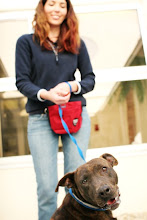Excessive barking can be one of the most challenging problems owners face. This behavior usually not only annoys the owners, but the owners friends and neighbors as well. All of which makes it very important to correct your out spoken doggies unnecessary vocalizations ASAP.
It is important to remember that barking is a dogs natural reaction to changes in their environment. Please allow your dog to indulge in a few reasonable barks before redirecting their attention. What is reasonable you ask? Well, a few barks at strangers passing by, other animals or loud noises are pretty common for most dogs. And what constitutes as not reasonable? That's simple, when it annoys your neighbors.
So what to do if your dog is an "unreasonable" barker? First you must answer the question: Why is your dog barking? Some dogs bark out of sheer boredom. The answer could be as simple as a change of scenery for the dog, or a few puzzle toys left out or hidden to keep Fido busy while you're gone.
If your dog seems to bark at everything they hear or see, sensory isolation might be the cure. Put your dog in a kitchen, laundry room or bathroom (with little or no windows, and not along a common wall,) along with their crate or bed. Try turning on some classical music before heading out to help muffle outside noises.
(Remember to always confine your dog to a room using a baby gate, and not a closed door, so that your dog does not feel trapped and panic.)
For more severe barking problems the owner must do a bit of sleuthing. Leave the house as usual, then sneak back and watch the dog from a hidden spot. When the dog begins to bark, make a brief and distracting noise to change the dogs point of attention. Repeat if and when the dogs barks again. Wait for the dog to settle, then leave.
If the this method does not work, the owner may also try entering the house with a loud NO BARK every time leaving calmly again. Repeat. Please make sure you have the patience this method requires before attempting to carry it out!
If your dog barks while you are at home, you may have a bossy dog! If you have a bossy dog (BARK let me out! BARK I want dinner! BARK let me in! etc...) then your task is relatively simple. Let your dog know that they are not the boss, YOU are! Make your dog work for everything they want. Your dog should sit (or preform another behavior from their repertoire) before receiving anything form you.
If your dog barks while you are at home, but is not a bossy dog, you may have a suspicious dog. These noisy pups take a bit more work and commitment. As odd as this might seem, the way to quite these pooches is to actually teach them to 'speak' on command. At the same time, teaching them to be "quiet" on command as well. In other words, you name the behavior in order to control it.
Your first task is to find something that triggers the barking. For example, if your dog barks when some one knocks on the door, he will most likely be fooled (most dogs are) by a knocking on almost any hard surface. Knock a few times and when he barks say "speak speak!" and tell him he is a good dog. Then show him a tasty treat to distract him while saying "quiet" and asking him to sit to receive his reward. Repeat. When your dog has mastered this, congratulations! You have now shifted your dogs focus from the distraction to you!
I recommend setting up some trial runs with friends and neighbors. Go slow and be patient, and as always, try, try again.
It is also important to remember to allow your dog their 'acceptable' barks; About 3-5 should be sufficient, before asking them to be quiet.
Remember that barking is a normal response for all dogs to a stimulus in their environment. You should never leave an excessive barker outside un-attended. (For your neighbors sake!)
In addition, did you know that barking can relive tension in dogs? It also drives away strangers and serves as a way of communication for the species. Most dog owners want their dogs to bark if they hear some one at the window, or see a person enter the yard. Dogs are natural warning devices, however it is important that they know when to stop, and do so when asked.
Hopefully with these helpful hints and tips you and your dog can live in world of civilized conversations!
Subscribe to:
Post Comments (Atom)





No comments:
Post a Comment